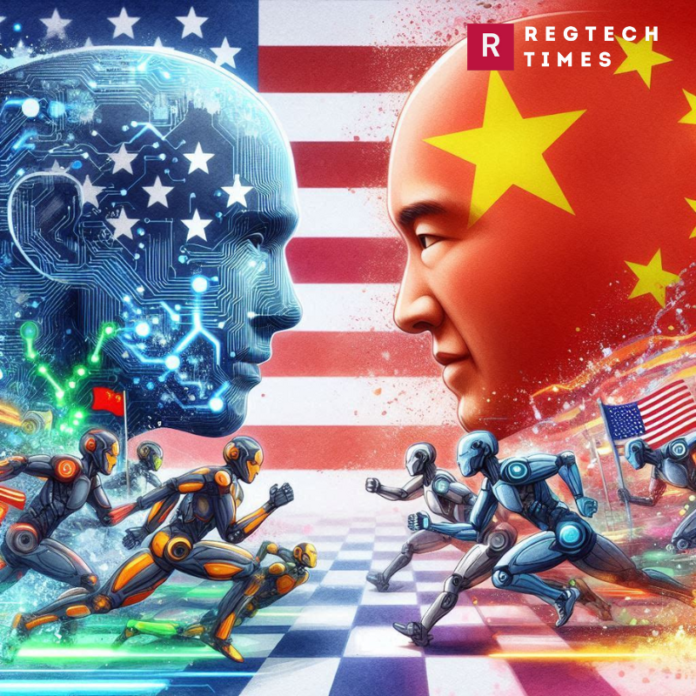In a dramatic escalation of what experts now call a full-blown “spy war,” the United States and China are rapidly intensifying their covert operations against each other. The recent arrest of a suspected Chinese hacker accused of stealing COVID-19 vaccine research has brought renewed focus to the silent yet brutal world of espionage. And this time, both sides are no longer keeping it quiet.
Just days after the FBI apprehended 33-year-old Chinese national Xu Zewei at Milan’s Malpensa Airport for allegedly stealing sensitive American biomedical research, FBI Director Kash Patel delivered a fiery message. “The CCP’s relentless attacks on our institutions will not go unanswered,” he declared, branding the arrest as “manhunting the CCP.” It was a chilling signal that America’s top law enforcement agency is actively hunting foreign spies, wherever they hide.
⚔️ Spy vs. Spy: A Game of Secrets and Surveillance
Almost immediately, China’s Ministry of State Security (MSS) fired back, revealing that it had disrupted three foreign espionage plots inside China. In one particularly disturbing case, a government official was seduced abroad, secretly photographed in compromising situations, and then blackmailed into stealing classified documents. Although China didn’t name any foreign power directly, the timing of the announcement made the target clear.
The twin developments are more than coincidence. They mark a new phase in U.S.-China relations—one where information is the ultimate weapon, and both nations are ready to go to great lengths to gain an edge in artificial intelligence, biotechnology, military systems, and quantum computing.
Chilling Chinese Espionage Plot Erupts at Hotel in Alps Near F-35 Facility
???? Cyber Armies and Shadow Operatives
A recent report by American cybersecurity firm Margin Research describes China’s “cyber militia system”—a network of civilian volunteers guided by local governments and the military. These operatives work in the shadows, targeting everything from corporate secrets to advanced military technologies. At the same time, the U.S. has rolled out new tactics to lure Chinese insiders. CIA videos now openly invite disillusioned Chinese officials to leak secrets in exchange for safety and freedom.
Dennis Wilder, a former CIA deputy director, confirms the reality of these covert efforts. “Both sides have accelerated their spy operations,” he said, adding that the U.S. intelligence community has become more aggressive in recruiting Chinese sources through direct digital appeals. “Similarly, MSS operations against Americans have also intensified.”
???? Academic Institutions and High-Tech Espionage
The battlefield is no longer just embassies and secure buildings—it’s university campuses and corporate boardrooms. U.S. lawmakers have raised red flags about deep financial ties between major universities and Chinese organizations. A congressional investigation revealed that the University of California, Berkeley received over $220 million from Chinese entities, including Tsinghua University, a known partner of the Chinese government.
This scrutiny has led to sweeping visa bans. Secretary of State Marco Rubio recently revoked visas for Chinese nationals linked to the Chinese Communist Party or involved in sensitive scientific fields. The underlying message is clear: academic openness is being overtaken by national security concerns.
On the Chinese side, the crackdown is equally severe. China recently arrested a couple accused of spying for British intelligence, with both individuals reportedly working in highly confidential state departments. MSS has also launched a massive public campaign urging civil servants to report any unusual contacts with foreigners.
???? Technology: The New Theatre of Spy War
Despite geopolitical tension, tech giants remain entangled in this global standoff. Nvidia and AMD announced they can now resume some AI chip sales to China, after the Trump administration relaxed earlier export controls in exchange for greater access to critical minerals. Still, experts warn that commercial trade won’t stop the espionage race.
“Even if some chip sales resume, surveillance and public warnings will persist,” said Denis Simon, a fellow at the Quincy Institute. He added that the ongoing intelligence arms race is pushing both nations to view every entity—startups, scholars, even dating apps—as potential threats.
According to Sheena Greitens of the University of Texas, the espionage struggle has evolved from a series of isolated cases into a systemic, government-wide campaign. “These cases show both the growing strength of Chinese intelligence and the increasing global effort to counter it,” she said.
???? Arrests, Dead Drops, and Biological Smuggling
The latest headlines have all the markings of a Cold War thriller. U.S. prosecutors recently charged two Chinese nationals for allegedly trying to recruit U.S. Navy personnel and paying them $10,000 via a “dead drop” for sensitive military secrets. Around the same time, three Chinese researchers were arrested in Michigan for allegedly smuggling biological materials into the country under false pretenses.
In response, China continues its campaign of arrests and warnings. But analysts say these moves also serve a domestic purpose—reminding Chinese citizens that Big Brother is watching and that betrayal comes with a heavy price.
Spy Games! Denmark Summons U.S. Ambassador Over Shocking Espionage Claims
???? Mutual Paranoia: The New Normal
With trust in short supply, both the U.S. and China appear locked in a cycle of mutual suspicion and overreach. Patel’s FBI has increased public disclosures of Chinese espionage cases, while Beijing uses its media to spotlight the foreign infiltration of its ranks. The result? A digital iron curtain that splits the world in two: one side of open democracies increasingly wary of foreign influence, and another of authoritarian surveillance states tightening their grip.
As Simon notes, “We may be entering a new phase in which mutual paranoia is the default posture.”
With tensions rising and arrests mounting, it is no longer just a battle over information—it is a full-blown intelligence war. And in this war, silence is no longer golden. Both sides are shouting their warnings loud and clear.


